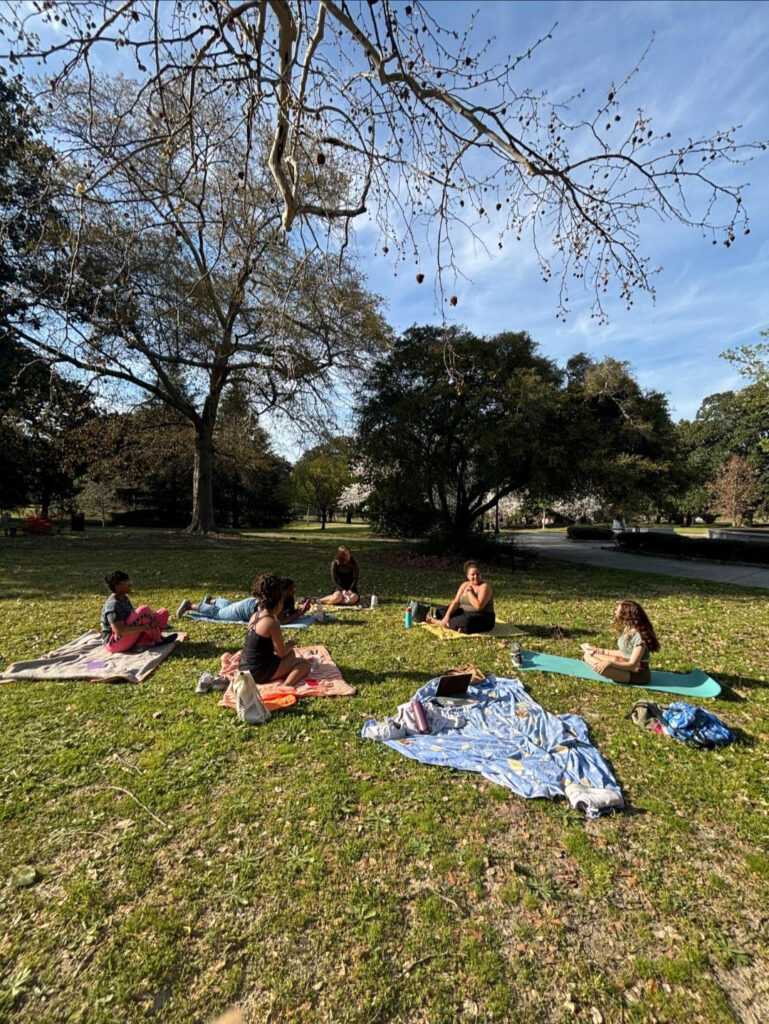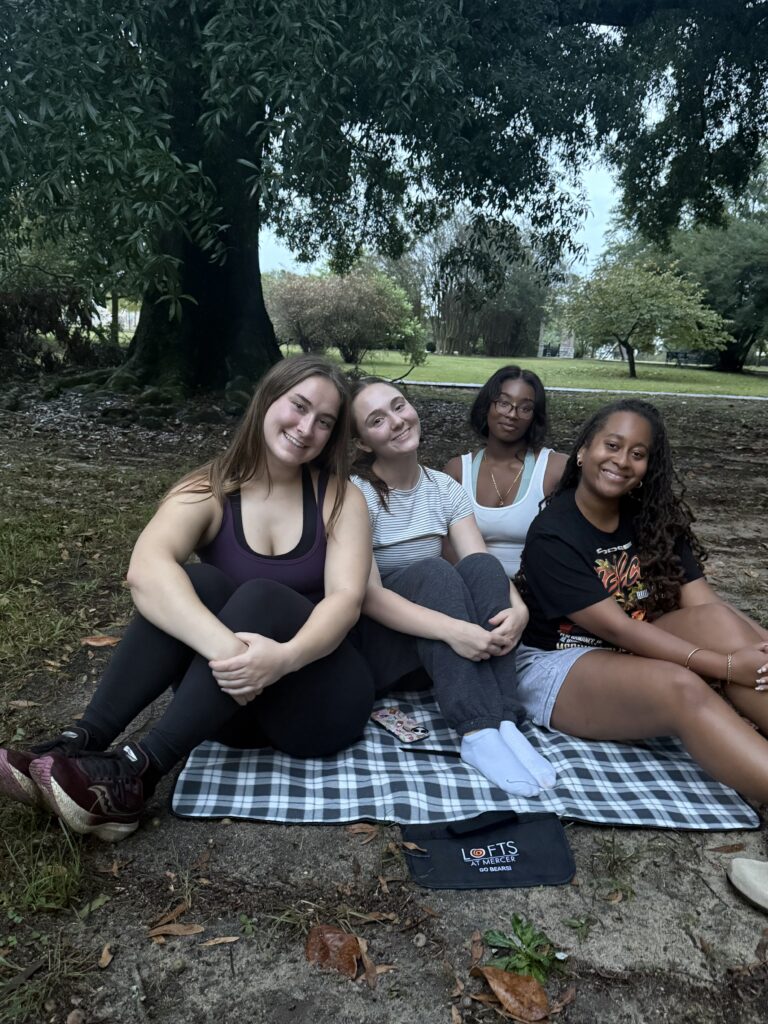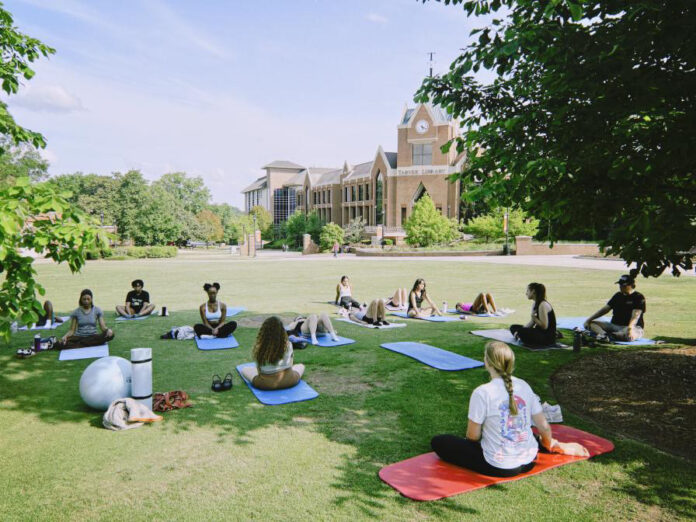College can be a particularly stressful time for young adults as they adjust to juggling the demands of classes, jobs and their personal lives. Mindful Mercer is a student organization that creates a space for establishing positive mental health habits through stress relief activities.
Mindful Mercer President Anna Strupp, a senior psychology major, said she understands how stressful college students’ lives can be and the impacts stress can have on a person’s mental and physical health.
“On college campuses, we see that students are overwhelmingly stressed,” she said. “Mindful Mercer is supposed to be a place that protects and promotes mental health through meditation and mindfulness. That could be through yoga, guided and talking meditation, or it could just be an open discussion about our mental health and what we’re doing to connect with ourselves.”
Thirty-two percent of college students reported experiencing moderate to severe anxiety in the 2024-25 Healthy Minds Study, which annually reviews mental health trends at universities across the country. While that number has decreased by 5 percentage points over the last three years, there are still thousands of students who struggle with being overwhelmed in a new environment away from home.
Counseling and Psychological Services, or CAPS, provides in-person and virtual mental health counseling to all Mercer University students. CAPS also sponsors a student group called AWARE, which advocates for wellness and mental health and will begin offering peer counseling in January.
While individual therapy sessions with a CAPS professional or AWARE are one-on-one, Mindful Mercer offers students ways to release stress with their peers, Strupp said.
Mindful Mercer typically meets biweekly on Thursdays to participate in large group meditation and yoga, which Strupp said can be more inviting for students who have never tried either activity before. The organization is dedicated to helping students learn mindfulness, the practice of being present in one’s current feelings, thoughts and surroundings without judgement.
“Mindfulness is being in this very moment and being in tune with your emotions and not thinking ahead or in the past. You are just focused on the space around you, the sounds in your environment, how your body feels, and with that comes a sense of calm,” Strupp said. “This is something that I’ve studied personally for psychology. It’s a coping mechanism to be mindful and an amazing tool. To me, mindfulness means hope.”
Strupp first joined Mindful Mercer in the fall of her freshman year because she wanted to practice meditation as she adjusted to being on her own for the first time. After her first meditation, she decided to remain in Mindful Mercer, serving as student engagement chair before taking on the role as president.
“When you come to college and don’t have any friends and you kind of just have yourself, you might as well be the most in tune with yourself as you can. I went to a meeting, and I felt this overwhelming sense of peace as the instructor was talking us through a guided meditation, and it was just an amazing feeling.” she said.


Strupp said Mindful Mercer is concerned with maintaining a space for general wellness for all students. While it can be difficult for students to find time for relaxation in their packed schedules, she said sometimes being in a club can make it easier to create a healthy routine while building community with other students looking to do the same.
“I think for a lot of people it’s helpful to schedule a time for yourself, otherwise you sort of keep procrastinating. Anxiety is the worst enemy of being present, and so as busy college students, a lot of people are coming to Mindful Mercer because they know they’re for sure going to have to sit down and be with themselves in whatever way that may mean to them,” she said. “I think there’s also a social aspect. I met a friend there; I have watched friendships grow through Mindful Mercer; and our entire executive board every year has just enjoyed going out and chatting with each other.”
Strupp said she believes it’s imperative for all students to find something that serves as an outlet for stress, whether it be meditation, yoga, exercise, drawing or another hobby. For her, meditating has allowed her to slow down and find peace in the present moment.
“I think Mindful Mercer ensures students a space at least once every couple of weeks where they can work on themselves. And, at least for me, that’s had overwhelmingly positive impacts. Mindfulness is just such an important tool to have. It works hand in hand with self-regulation and emotional regulation, and it’s a difficult skill, but it’s important,” she said. “Mindfulness and meditation are incredibly beneficial for your mental and physical health, so having a resource for students that are interested in doing it is important to me. I just want to keep protecting that space at Mercer so that if people want to be present with themselves, they have a supportive space for that.”

Dr. Amy Borchardt, associate professor of psychology, has studied meditation extensively in her research. Dr. Borchardt, who has presented at Mindful Mercer meetings in the past, has done research on health psychology and ways to buffer the impacts of stress on one’s physical, mental and social well-being. Most recently, she published an article in the Journal of Behavioral Medicine examining the effects of meditation on cardiovascular recovery from stress.
Dr. Borchardt said meditation requires a level of patience and mindfulness that doesn’t happen overnight but has measurable impacts on a person’s well-being.
“Meditation is a skill-building technique that teaches us how to better control our attention. People often get frustrated when they begin meditating because they believe they should be able to focus without distraction the first time they try it,” she said. “However, what meditation actually teaches you is how to observe those thoughts and feelings and redirect your attention without getting caught up in them. It’s a process that takes time to learn but can really help us build our mental fitness. Then, when we come upon a potentially stressful situation, we are better equipped to handle it.”
Dr. Borchardt said Mindful Mercer can help students build practices that will help improve their physical and mental health as they experience the stressors of life beyond college.
“Mindful Mercer is an excellent way to get started and learn different meditation techniques. Not only that, but it’s a way to help establish what I hope will be a lifelong practice,” she said. Meditating for five to 10 minutes a day every day has many health benefits, such as buffering depression and decreasing blood pressure. Committing to a club like Mindful Mercer helps busy students make time for their well-being, which is something that often gets pushed aside during college.”









